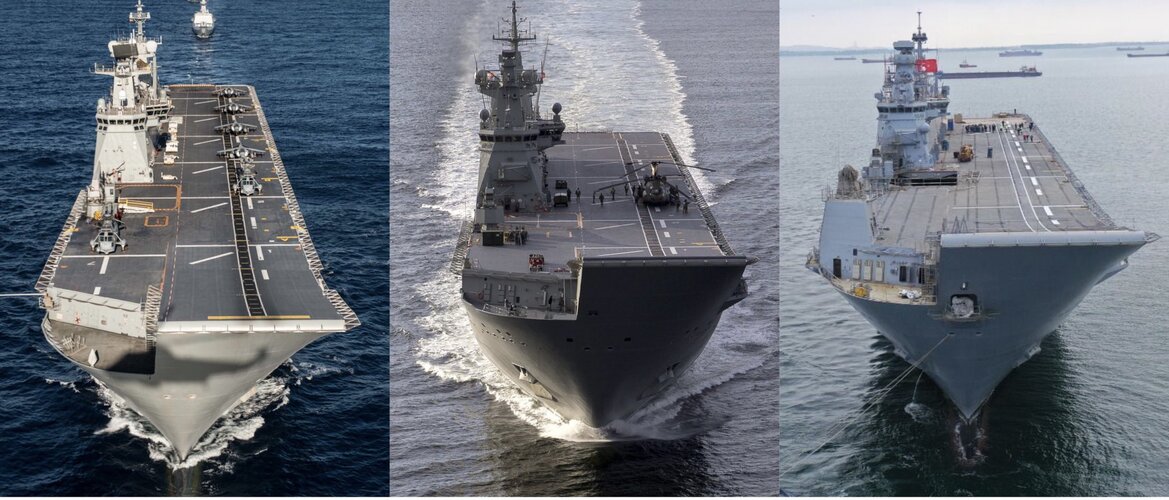Navantia Will Build An Amphibious Landing Ship for Turkey
(Source: EFE news wire; published Dec. 27, 2013)
(Issued in Spanish only; unofficial translation by Defense-Aerospace.com)
MADRID --- Navantia, the Spanish state-owned shipbuilder, has been selected, together with its Turkish partner SEDEF, to design and build an amphibious warfare ship and four landing craft for the Turkish Navy, the Spanish company announced today.
The contract, which is Navantia’s first foray into the Turkish market, will provide the shipyards at Fene-Ferrol and San Fernando-Puerto Real with about 800,000 man-hours of work, as well as 50,000-man-hours for its Navantia Systems subsidiary and 28,000 man-hours for Fabrica de Motores engine factory.
Navantia will provide design, technology transfer, equipment and technical assistance for local construction of the ship by SEDEF.
In addition, Navantia will also provide various types of equipment and sub-systems, such as engines, turbines and the integrated platform control system.
According to Navantia, its LPD design was selected because it has already been built and tested by the Spanish navy, as the "Juan Carlos I". Two other similar vessels have also been built by Navantia and delivered to the Royal Australian Navy, the "Canberra" and "Adelaide".
In addition, Navantia hopes to introduce its F-100 frigate designs to the Turkish navy.
-ends-
You are using an out of date browser. It may not display this or other websites correctly.
You should upgrade or use an alternative browser.
You should upgrade or use an alternative browser.
Turkish LPD
- Thread starter GTX
- Start date
Gov't replaces Koç with Spanish design in ship bid
A national warship project (Milgem) which was earlier awarded to Turkey's Koç Holding has been given to a Turkish-Spanish joint venture (JV) which used Spain's largest naval unit, Juan Carlos I, as a model.
The Turkish media reported on Sunday that the government made its final decision on a delayed tender to domestically design and build an amphibious landing platform dock (LPD) vessel for naval forces. The bidders for the tender, including the construction of Turkey's first aircraft carrier, were the RMK Marine, Desan and Sedef shipyards, which are owned by the Koç Group, Chamber of Shipping Commerce Chairman Cengiz Kaptanoğlu and Executive Committee of the Chamber of Shipping Chairman Metin Kalkavan, respectively.
In January, the government said it had awarded the ship project to Koç subsidiary RMK Marine, a decision which was opposed by local bidder Sedef Gemi İnşaat A.Ş., which filed a complaint with the Prime Ministry Inspection Board back in June. The owner of Sedef is known for his close links to the ruling Justice and Development Party (AK Party). The government later changed its mind in September about awarding the project to RMK, a move that follows earlier tension between Koç and Prime Minister Recep Tayyip Erdoğan. Erdoğan had criticized Koç for supporting this summer's anti-government Gezi Park protests and had warned that they “would pay the price.”
Reports on Sunday said the Defense Industry Implementation Committee (SSİK) agreed last week to select the JV between Sedef and Spain's Navantia as the winner of the Milgem project, which is valued at $3 billion. This means the government chose an already existing model to a unique, local design. The first Turkish-made aircraft carrier will be modeled on the Juan Carlos I (L-61) belonging to Spain, which visited İstanbul last year. Desan, meanwhile, was offering to use a design based on South Korea's Dokdo class.
The decision to eliminate Koç from the multi-billion dollar project, however, is no surprise considering that the company has had tough times amid tension with the government. Fuel companies belonging to Koç saw two separate government audits while the group's bank was slapped with tax fines this year under the shadow of the Gezi demonstrations.
In an effort to increase the Turkish military's naval power, Ankara plans to construct a 220-meter-long military base on the water. However, since the Turkish Armed Forces (TSK) currently do not have any planes that are capable of vertical take-off and landing, the project will initially be used as a helicopter ship.
Turkey's first national aircraft carrier is expected to be equipped with a system that enables nonstop sailing for 30 days and 1,700 nautical miles. Its hangar and elevator systems will be constructed compatible with Joint Strike Fighter (JSF) planes which can take off and land vertically which Turkey will acquire in the coming years. It will also be able to carry up to 100 tracked military vehicles. Two landing craft air cushion (LCAC) hovercraft boats will be located in the pool section of the aircraft carrier.
A prominent Spanish property in NATO, Juan Carlos I was earlier under close watch of the Australian government, which said it would build two ships with the same design.
Source
Combat-Master
ACCESS: Top Secret
- Joined
- 15 July 2020
- Messages
- 1,250
- Reaction score
- 3,544
Port Acceptance Tests are being conducted currently.
View: https://www.youtube.com/watch?v=p1wYJrbd1IQ
Combat-Master
ACCESS: Top Secret
- Joined
- 15 July 2020
- Messages
- 1,250
- Reaction score
- 3,544
Similar threads
-
-
-
USSSPs (Unmaned Semifixed Sea Platforms) - European Union
- Started by Grey Havoc
- Replies: 4
-
-
Turkey commissions its first indegenous stealth warship: The MILGEM Class
- Started by TuAF
- Replies: 3

